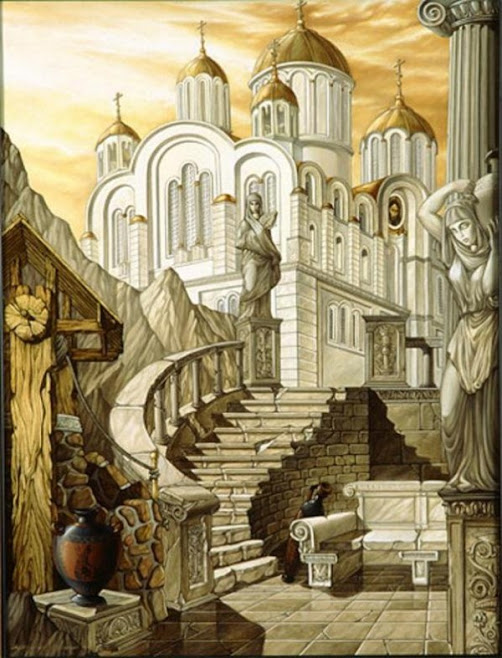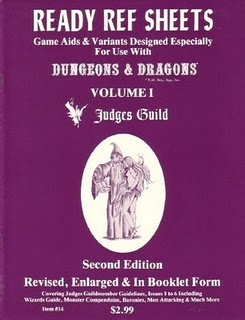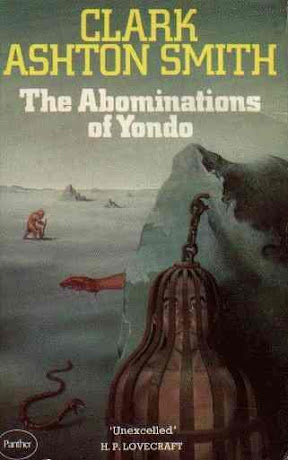The Old School Revolution… One Step At A Time!

While waiting while my car was being washed, I decided to amble over to the local game store. In the back, while I looked through the offerings, I overheard one of the staff giving a pitch…

The customer was a dad in his mid-thirties accompanied by what appeared to be his ten year old son. As the clerk detailed all the books in the system he was trying to sell – it was Pathfinder – I could see the poor father’s eyes start to glaze over.
“Of course you need the ‘Players’ Guide,'” the clerk expounded, doing his job. He reached for yet another over-priced hardcover and added, “And some of the best spells are in here” – pointing to another.
The kid was oblivious to the discussion. While his father got the pitch, his eyes were racing around while trying to make sense of all the stuff in the store.

I carefully chose my moment and sidled up behind the clerk where he couldn’t see me. Reaching into a bin, I pulled up a copy of the only OSR clone I could find in the shop – it happened to be Labyrinth Lord – and tapped the cover meaningfully with my index finger so the dad could see it. Deep into his droning presentation, the clerk took no notice. I slid the book back into the bin and returned to my casual browsing.
Carrying all the tomes the nerdy salesperson had laden him with, the dad approached me a few minutes later.

“What was that book you were pointing to?,” he asked me curiously.
I went and found it again.
“You don’t need all that crap,” I told him while motioning to his burden. “You can get everything you need in this book,” I explained. “It’s simple to understand and your kid can learn it himself.”
We talked for awhile and I made my case for the OSR. “The game moves faster and all that stuff is superfluous,” I explained. “Your son will appreciate a fast moving game more anyway.”
“You know, when I used to play in High School and college,” he told me as he considered my argument, “the rules weren’t very important to us after awhile anyway – we made up a lot of stuff and just did what we wanted to.”
“You don’t need anything but a basic framework,” I said. “You know enough already.”

“And I love the old-school style illustrations in this. Look everything we need, all the monsters, is in one book,” he said. I knew he was figuring the costs of all the Pathfinder rules and manuals the clerk had told him he “needed.”
“It’s only twenty bucks,” I pointed out. “If you need more stuff, just look for ideas online.”
“Come on,” he said to his son whole putting down the Pathfinder books. “We’re going to go with Labyrinth Lord – this will be great!”
As they headed for the check out counter I knew my work there was done.

True, Labyrinth Lord is not my favorite clone, but I was happy to see him walking out with it rather than more overpriced, useless junk.







Wonderful story!
*sniff* that was beautiful, man! 😉 seriously, way to spread the good word!
You, sir, have done a mitzvah.
Very nicely done! Bravo!
Also, cheers to your FLGS for even carrying OSR products!
They don’t have much of it.
A little is better than none… Of course the clerk was trying for a bigger sale, but sometimes it’s better to get a little first sale, and bring them back for more.
There’s a genuine hostility to old school models at the local game stores I go to. They don’t get it and they don’t want to understand it. They can’t believe that the latest thing isn’t better than the last thing.
It messes with their current business model. No splat books, no adventures, perhaps a couple books to provide inspiration – but the mainstream commercial model for table-top RPGs relies on a fiction of “official” publications, a deferral to the authority of an externally held “canon,” and an appeal to the instinct to complete a set (an instinct which is particularly strong among the sorts who are attracted to these sorts of games.) OSR kicks out the supports for that way of doing things, by making settings an outgrowth of the singular performance of the DM and the dialogue with players, and in its disinterest in fictions external to those produced by play.
Excellent story, well done you.
good work!
LL is really, really good. I prefer Basic Fantasy myself, and Pathfinder is not bad at all. But I also agree with everything you said otherwise.
I am just happy that OSR games are found in stores.
Well done, sir.
Thank you for your kind comments.
Great job, sir. I’ve been pushing my own favorite old school game, Dungeon Crawl Classics, pretty heavily as a better option to anything WOTC or Paizo has to offer.
Bravo!
*nods head in agreement*
LL is a much better game for a kid anyway. He’d have probably quit gaming if that’s where he started off. You have done a service to the community and the next generation of gamers.
I agree. If he wants to get into all that other stuff later, that’s fine.
You left out the part about the clerk attempting to throttle you over lost sales.
Otherwise a fine story! Well done!
Bravi, Bravi, Bravisimi!
Simply awesome. Well done.
Speaking as someone who plays Pathfinder twice a week (and who receives almost everything Paizo publishes), I want to thank you as well. You really only “need” the CRB and the Bestiary to play Pathfinder (and those resources are all online). It looks like the clerk was just trying to make a buck. It doesn’t matter what system you play, so long as you have fun, right?
I agree that the system that the group has the most fun with is the best, regardless of edition. That said, I am also glad that the author told someone about the OSR as an option, that is what people need to know, that there are options. Well played.
Brought a tear to me eye!
I bought a book just to have a system to follow, but realised they expected me to remember everything on all 600 pages. So I just created a system by myself, simple enough, but playable. And there are more systems online if you don’t wanna do that. I really don’t like Pathfinder, to much maths for me.
Well done sir!
Well, technically, the Pathfinder Beginner Box would have been the appropriate product for the sales clerk to be pushing. I bet the kids eyes would have lit up when he got that thing home.
I will say I still don’t understand “kids today”. By the time I was old enough to play an RPG I wasn’t just standing there while my Dad decided what to get. I was delving into the musty shelves myself and making my OWN discoveries! What’s with the kids today that they can’t even find their own games to play without relying on Daddy??
“The kid was oblivious to the discussion. While his father got the pitch, his eyes were racing around while trying to make sense of all the stuff in the store.”
I think that kid would have done just fine on his own but props to his dad for trying to help anyway.
FWIW, I am one of those “kids today”. I got into gaming all on my own, thank you very much. 😉
kids were already oblivious even in the mid-late 80s. every kid in my upper grade school classes assumed my AD&D books were for video games (i’d do book reports on them in front of class and have to explain that they were not). between video-oblivion and the cautioned constrains of current parents – it makes absolute sense that a lot of kids sense of imagination/discovery is tantamount to zombie stupor.
Of course the clerk was trying to make a buck, he was at work. Why didn’t you help the clerk out instead of making him look like a drug pusher. Speaking as someone who helps out at a FNGS and an RPG fan you could have just walked up and joined in on the conversation. Instead you chose to make the guy look greedy and incompetent. One of the major reasons most FNGS don’t carry those products is because no one wants to run them on an RPG night. The other product you mentioned is for the most part mainstream and is being run more often. If however you chose to help out the clerk, who knows they might be carrying more OSRs. They might have even *gasp* scheduled a Vintage RP event.
I have, believe it or not, tried to have productive discussions about the OSR at not one, but three of the shops in my area. The response has been pretty lame. There is a weird hostility to the idea than any older game, especially if its out of print and/or not being heavily promoted, could actually be better than the games that are coming out now. I also see a marked, a priori kind of antipathy to any suggestion that “bigger” and “newer” isn’t always “better.”
There’s more on this problem here: http://www.howlingtower.com/2012/03/dysfunctional-and-co-dependent.html
At the risk of being glib, “your broken business model is not my problem.” But it’s more complicated than that. RPG is, at heart, about singular performance. Contemporary capitalism is about the reproduction of experience: create one thing that promises an experience and sell many copies of it. This second equation is being compromised by ubiquitous, virtually free reproduction of digital assets. The OSR compromises the first in its emphasis on performance, on emergence from simple rules. It doesn’t need very much gear, and it doesn’t need a lot of publications to support it.
There is a real conflict, a tension, between gift-economy and commodity-economy elements of RPGs in general and what the OSR seems to be doing. People want to be compensated for their work, especially when their work is good, and other people want to support good work. A lot of the OSR consumption – people paying, really, for a lot of stuff they could get for free – has to do with a feeling of personal indebtedness (and the fact, too, that in our society, we often don’t really feel we are part of something unless we are paying for it.) The mainstream RPG publishing industry can’t participate in this, and instead, it is exploitative: it exploits “completion fever,” the OCD need to complete a canon. It exploits the (rather adolescent) need to have a rule-set that autonomously sustains a fiction. It even exploits power-fantasies, by mechanically rewarding players using splat-books for additional feats etc. (E.g., this comment on James M.’s blog, by Timothy Arthur: “… I made the mistake of only using the main rule book to make a character. I was utterly useless amid my fellow players who had modifiers that sent there dice roles into the 30+, due to class options, feats, traits and ability modifiers. …”) That is an industry that doesn’t want to move from a crude commodity model, that has grown too big to operate in the grey area between hobby and business that RPGs began in, and still, at their best, thrive in.
It’s a failed model. We have every right to call out this failure.
Why don’t people identify first with the consumer? Why do so many tend to immediately identify with the company/store/ etc.?